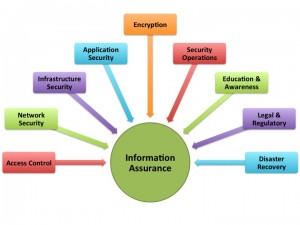 Whether they work for a government organization, private businesses or consulting firms, professionals performing jobs in information assurance provide services that are critical to ensuring the safety of their employers’ data in today’s technology-driven world. While their successes often go unnoted, failures in the realm of information assurance make major headlines. For businesses and educational institutions, a failure to safeguard their information can affect the bottom line and puts employee and customers at risk of identity theft. For government agencies, a breakdown in information assurance is often a matter of national security.
Whether they work for a government organization, private businesses or consulting firms, professionals performing jobs in information assurance provide services that are critical to ensuring the safety of their employers’ data in today’s technology-driven world. While their successes often go unnoted, failures in the realm of information assurance make major headlines. For businesses and educational institutions, a failure to safeguard their information can affect the bottom line and puts employee and customers at risk of identity theft. For government agencies, a breakdown in information assurance is often a matter of national security.
Information Assurance
As Techopedia explains, information assurance is a special subset of the information technology field that involves the protection of computers and networks. Sometimes referred to as information security or cybersecurity, information assurance concentrates on guarding computer systems against modern scourges like computer viruses, worms, malware, cyberattacks, phishing, and other forms of hacking. Because new threats are continually appearing, information assurance professionals must continually be alert to the latest developments in their field.
Information Security Analysts
A necessity for any company that handles private information, information security analysts review an organization’s computer systems, networks and technology policies. Their goal is to ensure that the system is accessible to those who legitimately need to use it, and that it is protected from those who would cause harm. According to the U.S. Bureau of Labor and Statistics, more than 75,000 information assurance professionals earned a median salary of $86,000 working as information security analysts in 2012. With the growing threats from cybercrime inspiring an astronomical projected job growth rate of 37 percent, the field is expected to add an additional 27,400 jobs by 2022.
Cybercrime Investigators
Cybercrime investigators use their technological backgrounds to investigate crimes committed using computers. Using forensic analysis techniques, they will document how the crime was carried out and attempt to trace it back to the attacker. Any information garnered about attacks is analyzed and used to prevent future episodes. While several law enforcement groups, government agencies and private companies have their own investigators, the FBI is the lead agency in all cyberattacks in the United States. Protecting the nation against cybercrimes has been one of the agency’s top three priorities for more than a decade.
Chief Information Security Officers
Charged with overseeing the security of an organization’s entire computer system, a chief information security officer has plenty of responsibility. These top-level executive must identify the steps necessary to maintain digital security and allocate resources appropriately. They manage the other employees working in the information assurance department and vet any outside hardware and software vendors. They are also responsible for having proactive plans in place regarding the company’s response to any cyberattack and investigating any breaches that do occur. Top-level executives like chief information security officers earned a median salary of $168,000 in 2012, according to the U.S. Bureau of Labor Statistics.
Related Resource: Cybersecurity
With more and more business being conducted online, the need for information assurance professionals is increasing rapidly, creating lots of job opportunities for skilled computer experts. Although many positions in the field are still open to those with the right combination of experience and industry certifications, many employers are coming to expect at least a bachelor’s degree in computer science, information technology or a similar field. Colleges and universities are responding to this growing demand by offering both undergraduate and graduate degree programs that are designed to prepare professionals for success in jobs in information assurance.
